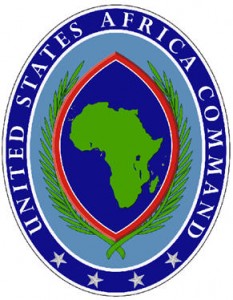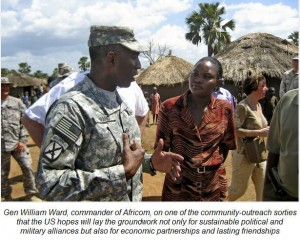During the presidential debate on Tuesday night, Barack Obama won praise from the worldwide liberal establishment when he said that the US has a moral obligation to use military force for humanitarian purposes.
He stressed, however, that just as the US must eschew unilateral action in favor of multilateral action in fighting the war on terrorism, it must do so in fighting the war on poverty as well. And he noted that, in both cases, this would be possible only if the US were to forge more sustainable diplomatic and military alliances around the world.
Therefore, it would probably come as a surprise to many of you to learn that President George W. Bush’s efforts to forge these alliances are being met with contempt and ridicule from the members of this liberal establishment.
 Specifically, last month, when Bush launched the US Africa Command (AFRICOM) – America’s first military mission focused on Sub-Saharan Africa – he insisted that:
Specifically, last month, when Bush launched the US Africa Command (AFRICOM) – America’s first military mission focused on Sub-Saharan Africa – he insisted that:
AFRICOM will enhance our efforts to bring peace and security to the people of Africa and promote goals of development, health, education, democracy and economic growth.
Unfortunately, distrust of Bush has become so visceral and irrational that his critics have dismissed AFRICOM as nothing more than a US Trojan Horse to exert military dominion over the African continent.
America doesn’t have a lack of empathy; they just don’t know the issues as well … They refuse to accept, because of their political ideology, that he has actually done more than any American President for Africa. But it’s empirically so … Clinton talked the talk and did diddly squat, whereas Bush doesn’t talk but does deliver.
[Live Aid founder and celebrated humanitarian Bob Geldof in the June 2005 issue of TIME magazine; quoted also in The iPINIONS Journal, June 20, 2005]
Ironically, the people criticizing Bush for launching AFRICOM are the same ones who condemned him for failing to use military force to stop the genocide still raging in Darfur; or to stop the genocide that raged in the Congo between 1998-2003, during which almost 4 million people were killed, making the Rwandan genocide in 1995 seem like a drive-by shooting by comparison.
Of course, through the prism of Iraq, these critics are inclined to see every military move Bush makes in the developing world as nothing more than a naked grab to control the wealth and natural resources of weaker nations.
Never mind that the US is spending far more in Iraq than it is profiting from control over that country’s oil wealth. Indeed, Obama’s most persuasive criticism of Bush in this respect is that he’s driving America deeper into debt trying to build up Iraq’s economy while Iraqi leaders are sitting on billions of dollars in surplus from oil revenues.
Meanwhile, these critics seem oblivious to the fact that Bush is only seeking to use AFRICOM in Africa the way his predecessors have used NATO in Europe since World War II, namely, as a stabilizing force for regional security, development, diplomacy and prosperity. For example, no one can deny that but for the intervention of US-led NATO forces, ethnic cleansing in Europe’s backyard (i.e., in Bosnia in 1995 and in Kosovo in 1999) would have rivaled the genocides in Darfur and the Congo cited above.
 More to Obama’s point, however, they fail to recognize that AFRICOM will enable the US to coordinate more effectively with international agencies to provide humanitarian assistance throughout the continent.
More to Obama’s point, however, they fail to recognize that AFRICOM will enable the US to coordinate more effectively with international agencies to provide humanitarian assistance throughout the continent.
That said, I am mindful that much of this criticism of Bush stems from President Bill Clinton’s unilateral attempt in 1993 to bring peace and stability to Somalia, which ended with the notorious “Black-Hawk-Down” debacle and US forces retreating in a humiliating defeat reminiscent of Vietnam.
But the lesson of this unfortunate experience is not that Americans should become chicken hawks. Instead, it is, as Obama argues, that the US should establish military alliances that would enable it to manage conflicts in Africa, by force if necessary, to prevent them from descending into open warfare and humanitarian catastrophes.
Finally, it is patently specious to argue that China and Russia are doing a better job of engaging in Africa. After all, the leaders of these countries have made it clear that their only interest in Africa is to forge economic alliances that will enable them to exploit the continent’s natural resources.
In fact, in this respect, they have shown no moral scruples about doing business even with genocidal dictators, like President Omar al-Bashir of Sudan – who was indicted a few months ago by the International Criminal Court for the crimes against humanity his militias have committed in Darfur.
By contrast, American leaders (now) find such amoral profiteering and doing business with such leaders morally anathema.
So, here’s to the truly constructive engagement of AFRICOM in Africa!
NOTE: Am I the only one who finds it fateful that the (white) leaders of the world’s richest nations are doing all they can to cast America as a banana republic just as voters are poised to elect the first black president of the United States…?
For example, Russian President Vladimir Putin displayed his trademark Cheshire-Cat grin when he proclaimed this week that the US is no longer a superpower; and Australian Prime Minister Kevin Rudd could barely contain his schadenfreude when he chimed in, with no hint of irony, that China will be the savior of capitalism.
But I suspect Russia and China will demonstrate in fairly short order why the world would be a better place with the US, even with a black president, as the sole superpower.
Related Articles:
Bush has done more for Africa than any other American president
Even the Post concedes Bush has done more for Africa
Genocide in DR Congo: Rwanda with a vengeance
The UN debates and dithers as Africans die by the thousands…every day
US, China and Russia in new Cold War on the African front
Leave a Reply
You must be logged in to post a comment.